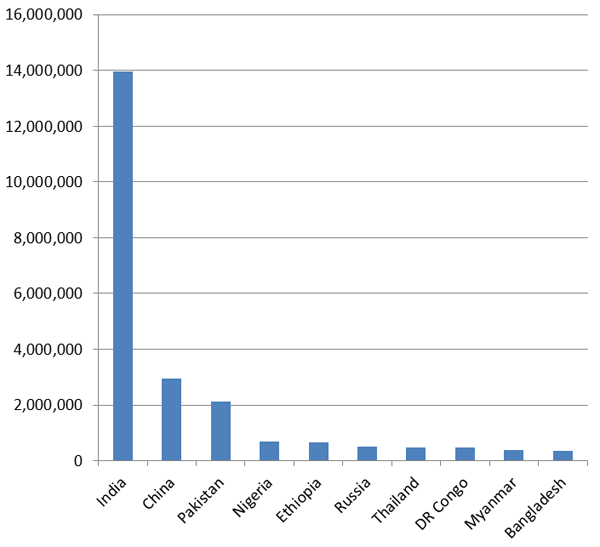
17th October 2013 Nearly 30 million people are living in slavery, according to latest estimate Slavery was banned globally by the UN Declaration of Human Rights in 1948. However, it continues to be a significant problem today. A new Global Slavery Index – the first of its kind – estimates that 29.8 million people are living as slaves in 2013.
There is evidence of slavery that predates written records. It is thought to have first proliferated after the invention of agriculture during the Neolithic Revolution about 11,000 years ago. In today's world, there are various types of slavery. These include human trafficking, forced labour, forced marriage, debt bondage and child soldiers. In all cases, the victims are treated as property to be bought and sold, exploited and denied the freedom which others take for granted. The Walk Free Foundation is a new global charity based in Perth, Australia, with a stated aim of ending modern slavery within a generation. It hopes to achieve this by mobilising a global activist movement, generating high quality research, enlisting businesses and raising unprecedented levels of capital, to drive change in those countries and industries bearing the greatest responsibility for slavery. As part of this effort, Walk Free has just released the Global Slavery Index 2013 which it claims is the most accurate and comprehensive assessment of slavery that has ever been published. This survey has statistics for 162 countries, based on detailed consultations with an international panel of experts, think tanks, and academic institutions. It ranks each country using a combined measure of three factors — prevalence of modern slavery by population, the number of child marriages and the amount of human trafficking in and out of a country. The ranking is heavily weighted to reflect the first factor, prevalence. In terms of the percentage of its population that is enslaved, Mauritania in West Africa is ranked first. It has an estimated 150,000 slaves — or about 4.47% in a total population of just 3,359,000. The Caribbean nation of Haiti is in second place (2.16%), with Pakistan ranked third (1.23%). In terms of absolute numbers (as opposed to just percentages), India has by far the most slaves. As shown in this graph, there are nearly 14 million, almost half of the worldwide total. China follows, with an estimated 2.9 million enslaved, and Pakistan comes in third with slightly over two million. The top 10 countries together account for more than 22 million of the 29.8 million people enslaved. If the total number of slaves today was represented by a country, it would be equivalent to the entire population of Malaysia. If represented by a U.S. state, it would be second only to California in population.
Iceland, Ireland and the United Kingdom are tied last, with a ranking of 160. This does not mean these countries are slavery-free. On the contrary, it is estimated that 4,200 – 4,600 people are in modern slavery in the UK alone. Nick Grono, CEO of the Walk Free Foundation, says in a press release: "It would be comforting to think that slavery is a relic of history, but it remains a scar on humanity on every continent. This is the first slavery index, but it can already shape national and global efforts to root out modern slavery across the world. We now know that just ten countries are home to over three-quarters of those trapped in modern slavery. These nations must be the focus of global efforts." Professor Kevin Bales, lead researcher on the Index: "Most governments don't dig deeply into slavery for a lot of bad reasons. There are exceptions, but many governments don't want to know about people who can't vote, who are hidden away, and are likely to be illegal anyway. The laws are in place, but the tools and resources and the political will are lacking. And since hidden slaves can't be counted it is easy to pretend they don't exist. The Index aims to change that." The report is endorsed by individuals including former Secretary of State Hillary Clinton, former Prime Ministers Tony Blair, Gordon Brown and Julia Gillard; and leading philanthropists, Bill Gates, Sir Richard Branson and Mo Ibrahim, as well as academics, business leaders, and policy makers. It can be viewed at GlobalSlaveryIndex.org.
Comments »
|








